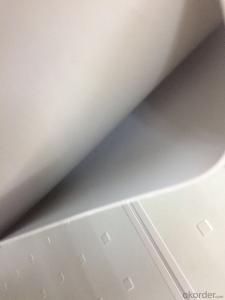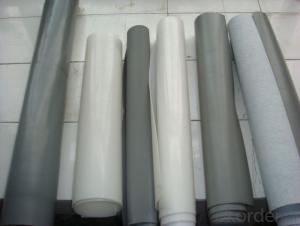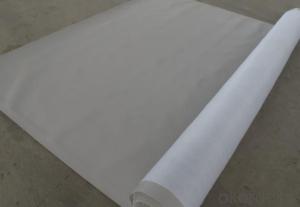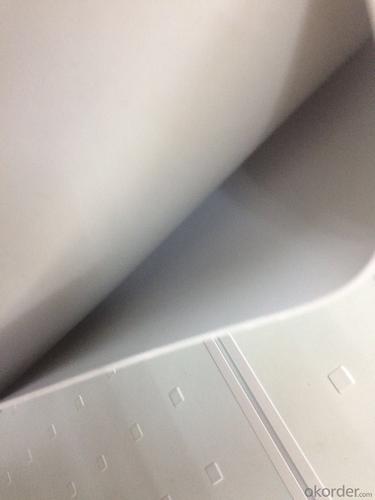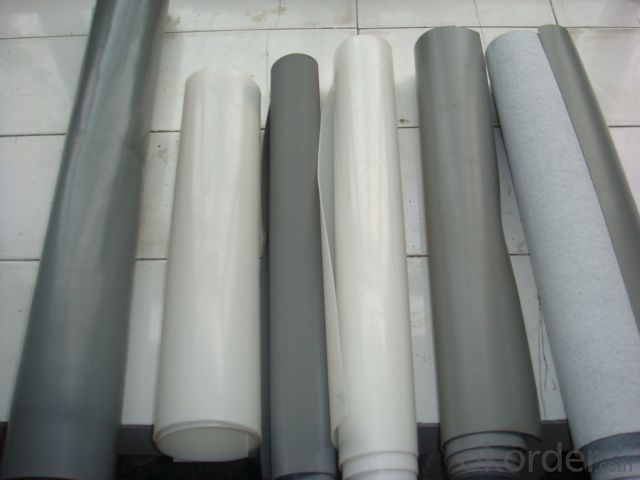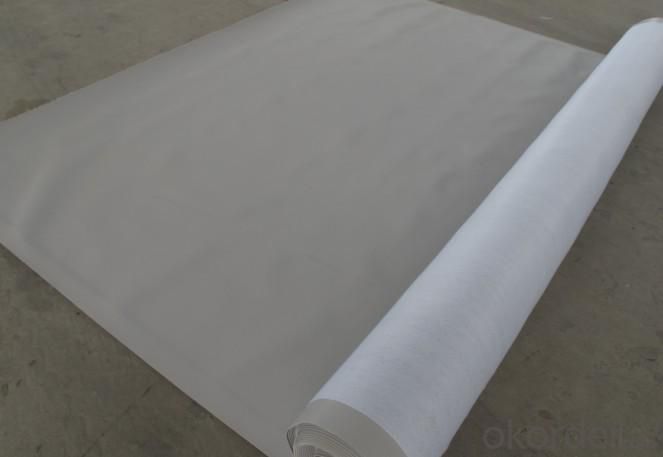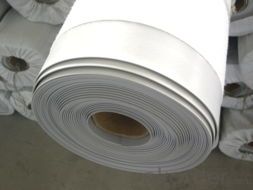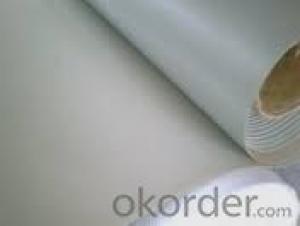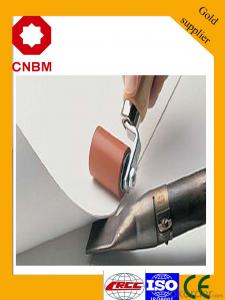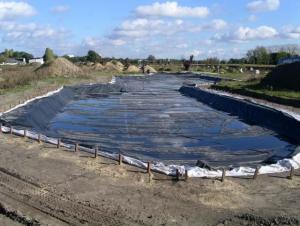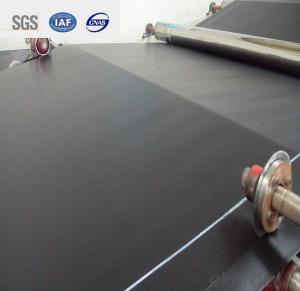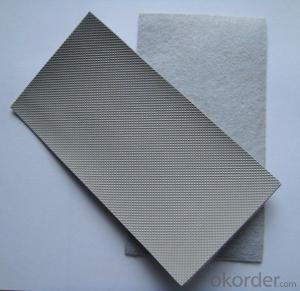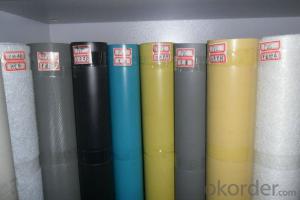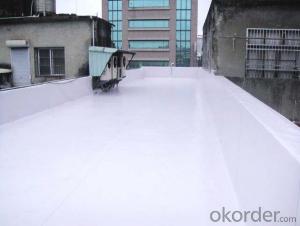PVC Waterproofing Membrane from Manufactory
- Loading Port:
- China Main Port
- Payment Terms:
- TT or LC
- Min Order Qty:
- 5000 m²
- Supply Capability:
- 100000 m²/month
OKorder Service Pledge
OKorder Financial Service
You Might Also Like
PVC waterproofing membrane
Polyvinyl Chloride (PVC) waterproof membrane is a new polymer waterproof membrane which is made from polyvinyl chloride resin, and mixed with plasticizer, filler, antioxygen, ultraviolet absorber and other auxiliaries.
Product Applications:
1. All kinds of roofs, such as steel structure roof, planted roof etc.
2. Underground engineering, such as basement, subways, tunnels, air raid shelter, etc.
3. Other projects like artificial lake, dam, water reservoir, grain storehouse, etc.
Product Features:
1. Excellent aging resistance.
2. Root resistant penetration, specially used on planting roof.
3. Welding installation. Joints are solid and environment friendly, no pollution.
4. High tensile strength, good elongation and dimensional stability.
5. Good plasticity, easy and suitable for details installation.
6. Fireproof. Fire extinguished out of the ignition resource.
7 Surface is smooth, no fading and dirty resistant.
Product Specifications:
1. Size: 2.05(width)*20m (length), as clients' request
2. Thickness: 1.2mm; 1.5mm; 2.0mm, etc
3. Type: Homogeneous, Reinforced, Fabric back
4. Exposed and Non-exposed
5. Color: white, Grey or customized
FAQ:
Q: Can I get samples?
A: Yes, we could arrange samples for free.
Q: Can I do the third party testing before loading?
A: Yes, we could accept the third party testing.
Q: Which kind of payment in your company?
A: We could accept TT, LC at sight, etc.
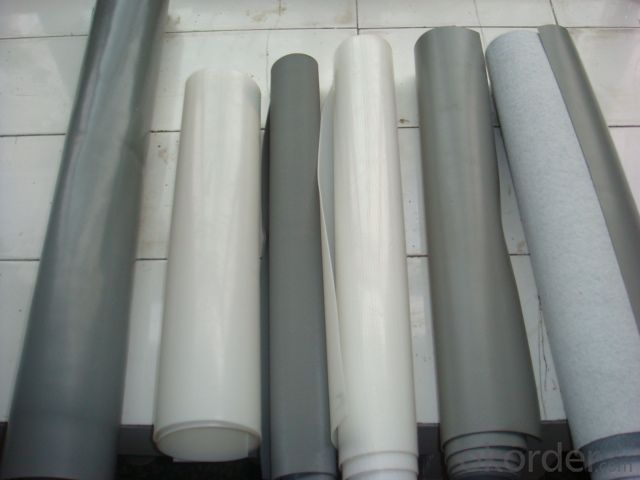
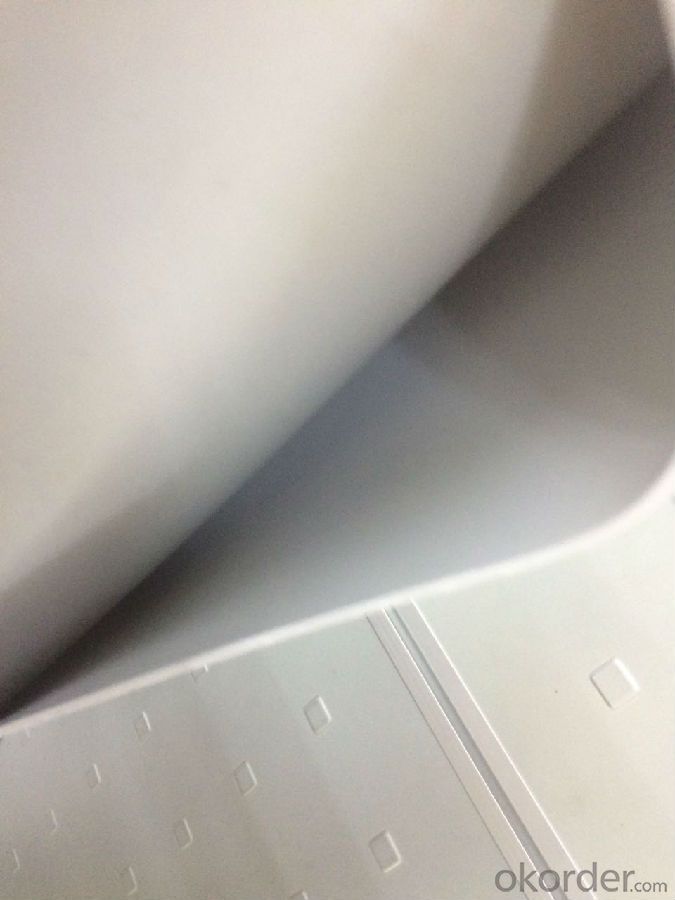
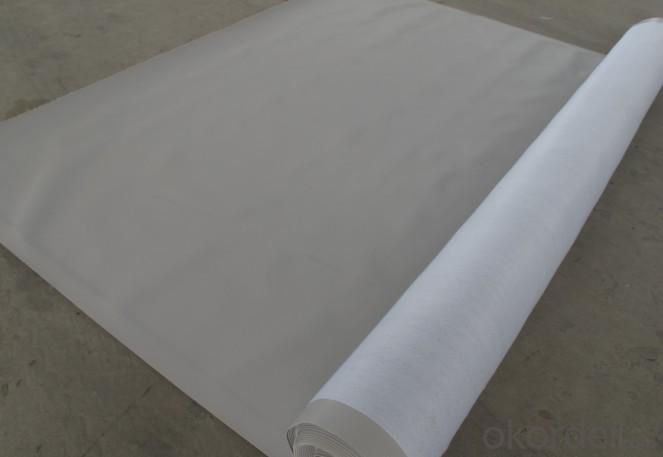
- Q: Is a waterproofing membrane resistant to mold and mildew growth?
- Indeed, the resistance of a waterproofing membrane to the growth of mold and mildew stems from its specific design, which aims to establish a barrier against moisture infiltration. This impedes water seepage and the subsequent development of mold and mildew. Through the effective sealing of the area, these membranes eradicate the favorable conditions for the proliferation of mold and mildew, such as dampness and moisture. However, it is important to acknowledge that although the membrane itself exhibits resistance to mold and mildew growth, it does not guarantee absolute protection against these issues. Proper installation, regular maintenance, and ensuring adequate ventilation play pivotal roles in preventing the long-term growth of mold and mildew.
- Q: Does a waterproofing membrane require any special precautions during storage?
- Yes, a waterproofing membrane does require special precautions during storage. The membrane should be stored in a dry and cool area, away from direct sunlight and extreme temperatures. It is important to protect the membrane from moisture, as any exposure to water or high humidity levels can compromise its performance. Additionally, the membrane should be stored in a vertical position, and not stacked horizontally or folded, to prevent any damage or deformation. It is also recommended to keep the membrane away from sharp objects or any materials that may puncture or tear it. By following these precautions, the integrity and effectiveness of the waterproofing membrane can be preserved during storage.
- Q: Does a waterproofing membrane prevent water damage to building materials?
- Yes, a waterproofing membrane is designed to prevent water damage to building materials. It acts as a barrier that prevents water from penetrating into the structure and causing damage. The membrane is typically applied to areas that are susceptible to water intrusion, such as roofs, basements, and foundations. By creating a waterproof seal, it effectively prevents water from seeping through and damaging the building materials. This helps to protect the integrity of the structure and can prevent issues such as mold growth, rotting, and deterioration of materials. However, it is important to note that the effectiveness of a waterproofing membrane can vary depending on the quality of the product and the proper installation. Regular maintenance and inspections are also necessary to ensure that the membrane remains intact and continues to provide protection against water damage.
- Q: Is the waterproofing membrane an insulating material?
- Insulation board: plastic plate is made of plastic sheet, plastic for the synthesis of polymer compounds, can be free to change the body style. Plastic is the use of monomer raw materials to synthesis or condensation reaction polymerization of materials, synthetic resin and filler, plasticizers, stabilizers, lubricants, colorants and other additives, and its main component is synthetic resin.
- Q: Can a waterproofing membrane be used on tunnels with security systems?
- Yes, a waterproofing membrane can be used on tunnels with security systems. In fact, it is highly recommended to use a waterproofing membrane in tunnels, especially those with security systems, to protect the infrastructure and valuable equipment from water damage. Waterproofing membranes are designed to prevent water infiltration, providing a protective barrier against water leakage and potential moisture-related issues such as corrosion, mold growth, and structural deterioration. By using a waterproofing membrane in tunnels with security systems, the integrity of the tunnel structure and the functionality of the security systems can be preserved, ensuring the safety and security of the facility.
- Q: Is a waterproofing membrane suitable for both residential and commercial applications?
- Indeed, both residential and commercial applications can benefit from the use of a waterproofing membrane. This versatile material can effectively safeguard buildings and structures against water damage in various environments. Whether it be a residential dwelling or a commercial edifice, foundations, roofs, walls, and other vulnerable areas can be fortified with a waterproofing membrane to prevent water infiltration. In doing so, it acts as a protective shield, averting issues like leaks, mold, and decay that may arise from water seepage. Moreover, the adaptability of a waterproofing membrane allows for customization to address the specific needs and prerequisites of both residential and commercial applications, thus rendering it an appropriate choice for any building type.
- Q: Are waterproofing membranes flexible?
- Waterproofing membranes, generally, exhibit flexibility. Their purpose is to be adaptable, enabling them to mold and adjust to the contours and shifts of the surfaces they are applied on. This adaptability effectively seals off any openings, fissures, or connections, effectively barring water infiltration into the foundation. Additionally, the elasticity of waterproofing membranes empowers them to endure the expansion and contraction caused by temperature fluctuations or structural shifts. In conclusion, the flexibility of waterproofing membranes is an essential attribute that guarantees their resilience and efficacy in safeguarding structures against water-related harm.
- Q: Asphalt composite tire flexible membrane is SBS
- The normal SBS membrane is in the high-grade waterproofing membrane, and asphalt composite tire flexible waterproofing membrane is a low-grade materials, the national industrial policy will soon stop its application in the field of engineering.
- Q: Can waterproofing membranes be used on buried pipelines?
- Yes, waterproofing membranes can be used on buried pipelines. Waterproofing membranes are designed to provide a protective barrier against water and moisture, and they can be applied to various surfaces, including buried pipelines. The membranes are typically made of materials such as bitumen or synthetic polymers, which are resistant to water penetration. When applied to buried pipelines, waterproofing membranes help prevent water infiltration, which can cause corrosion and deterioration of the pipeline material. They act as a barrier, preventing water from reaching the pipeline's surface and protecting it from potential damage caused by moisture. Additionally, waterproofing membranes also offer protection against other external factors, such as soil chemicals or gases, which can potentially cause harm to the pipeline. By creating a waterproof barrier, the membranes help extend the lifespan of buried pipelines, reduce maintenance costs, and improve overall performance. It is important to note that the selection and application of waterproofing membranes should be carried out by professionals who are knowledgeable in pipeline construction and waterproofing systems. Proper installation techniques and compatibility with the pipeline material are crucial to ensure the effectiveness of the waterproofing membranes.
- Q: Are waterproofing membranes resistant to hydrocarbons?
- Yes, waterproofing membranes are generally resistant to hydrocarbons. They are designed to provide a barrier against water and other liquids, including hydrocarbons, preventing them from penetrating through the membrane and causing damage to the underlying structure.
Send your message to us
PVC Waterproofing Membrane from Manufactory
- Loading Port:
- China Main Port
- Payment Terms:
- TT or LC
- Min Order Qty:
- 5000 m²
- Supply Capability:
- 100000 m²/month
OKorder Service Pledge
OKorder Financial Service
Similar products
Hot products
Hot Searches
Related keywords
